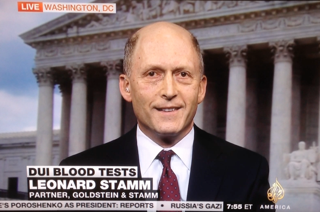Last week the Supreme Court decided the case of Heien v. North Carolina. In an 8-1 decision, the Court decided that even though an officer stopped a driver for conduct that was later decided NOT to be illegal, that the officer’s objectively reasonable belief that the conduct was illegal saved the stop from violating the Fourth Amendment. Surprisingly, some of the justices that can usually be counted on to protect the privacy rights of Americans, namely Justices Scalia (yes he is one of the better ones on Fourth Amendment issues), Ginsburg, Kagan, and, frequently Kennedy, failed to do so in this case. Only Justice Sotomayor dissented from the decision in Heien.
The Heien case dealt with what I will call the two versus three brake light issue. Many states enacted laws requiring two brake lights on cars and also laws requiring all equipment on a car to be working. The two brake light laws were enacted at a time when cars only had two brake lights. Since the enactment of these laws, many cars have been made with three brake lights. As is not uncommon, in many states the law has lagged behind technology. In those states, there has been a legitimate debate about whether a car with three brake lights, and one out, was in violation of the law.
In Heien, the officer stopped a car with three brake lights, and one out. Drugs were found in the car, which is why Heien challenged the stop. The trial court denied his motion to suppress and Heien appealed. Subsequently, the North Carolina Court of Appeals held that two working brake lights were all that was required and reversed. (Maryland requires three). The North Carolina Supreme Court reversed and upheld the conviction, even though the State did not challenge the intermediate court’s ruling on the brake light law. So Heien appealed to the Supreme Court.
One might have thought that when the North Carolina intermediate appellate court ruled that Heine’s vehicle was not in violation of North Carolina law, and that the ruling was not challenged, that it’s conclusion that the stop was illegal would have been upheld, even though the quesstion was debatable at the time the officer stopped Heien. However, the Supreme Court ultimately held that because the officer’s belief that Heien’s vehicle was violating North Carolina law although wrong was objectively reasonable, the stop did not violate the Fourth Amendment. It is important to note that the Court did not say in Heien, as it has said in some cases, that although the officer violated the Fourth Amendment that the exclusionary rule should not apply where a statute or court decision requires the officer to act in a way that is later held to violate the Fourth Amendment. In Heien, the Court held that the officer’s stop did not violate the Fourth Amendment.
The decision is troubling for a number of reasons. One is that frequently high court decisions get watered down or misunderstood by officers, prosecutors, and lower courts resulting in an overall diminution of our Fourth Amendment freedoms, and hence an increase in the number of times drivers observably violating no law will be stopped and detained by police, and the stops will later be upheld by courts. In the past, an officer could not rely on unsettled legal issues to avoid the application of the exclusionary rule to a search and/or seizure. As Justice Sotomayor points out, there is not really any support in prior cases for rewarding an officer’s mistake of law. And there is little incentive for courts to resolve questions of law if they only need to decide if the officer’s belief that the law was violated was “objectively reasonable.”
Continue reading
 Maryland DUI Lawyer Blog
Maryland DUI Lawyer Blog


